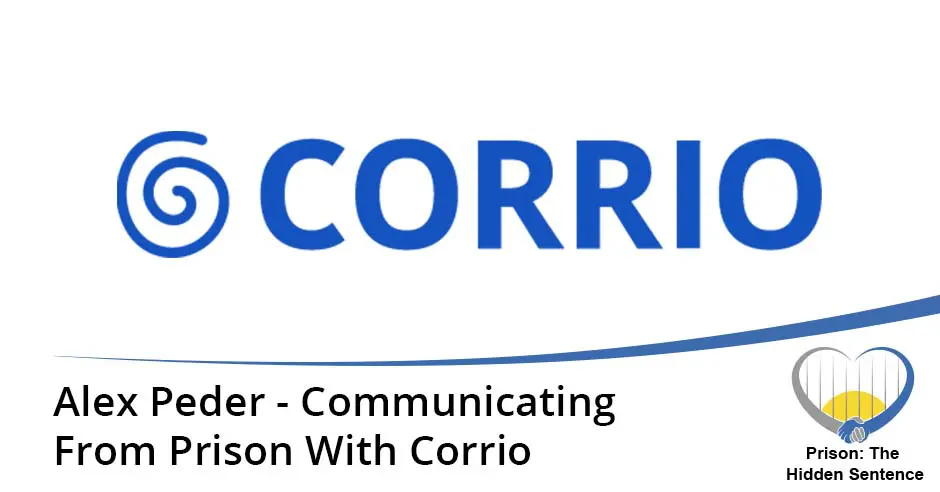
If you’ve ever missed a call from your incarcerated loved one, you know the pain and struggle of wondering if everything is okay. Alex Peder, CEO and Co-founder of Corrio SPC, felt there was something that could be improved about the situation. In fact, while he was incarcerated, he conceived the idea of Corrio-a better way to keep prison families, those on the inside and those on the outside, connected. Alex talks about the methods of communication common to us on the outside but is not used within the prison system. And it’s all done with a Corrio phone number. Listen to the podcast to learn more about how Alex is helping improve communication between incarcerated individuals and their loved ones.
—
Listen to the podcast here
Alex Peder – Communicating From Prison With Corrio
Julia, thanks for having me. A particular date comes to mind and I’ll start with that. It’s June 10th, 2010. I made the fateful decision to drink and drive and the accident ensued that I took responsibility for. I left two people dead and that sent me to prison at age 55. I thought my life had ended and that was all that was written for me, but that was clearly not the case.
I’ll never ever forget that moment in time and it does come back frequently in places and times when I never expect. It’s a constant with me. I landed in prison after going through the criminal justice system. When I got there that I had a very defined mandate for myself and that was I had to leave there better than when I arrived. I set forth a mission for myself and I’m on the cusp of delivering that with Corrio.
That was the eye-opener of all eye-openers. Landing in King County Jail, I wanted to make a phone call. It turns out you’ve got to have a calling account or you got to have a relationship with somebody who has a calling account and is willing to lend you some of their prepaid minutes. You then got to figure out how to make the phone call. It then rings out and nobody knows you called. There had to be a better way. Having a telecom background, I began to think. “Is this system built this way by design to not function properly or not provide the function of what the telephone was invented to provide?” That was the implementation at the jail where I landed and it turns out that that’s the implementation everywhere.
I used the term, “I fell,” loosely, but it is a common and popular term amongst us who have entered the fell in class. It was my two children, 10 and 17, at the time that I wanted to stay in touch with. I knew that I owed them more than they were receiving. I desperately tried to stay in touch and it was very hard. I kept thinking about ways to improve the system. That’s my nature. I’m a problem-solver. I take a long view of problems.
I had some time to spend on working that out, but it turns out I have a pretty amazing network of some pretty talented folks that didn’t abandon me. As a matter of fact, I was embraced. That was the superpower that I had forgotten that I had was the family and friends around me, in particular, my business partners now.
I live a pretty active life and networked pretty significantly beforehand. I had a long list of people I needed to talk with. Not just a one-time conversation but a routine conversation. Getting to the phone and being able to make a call when you had the time to do it because people in prisons, they’re busy. They’re programming and doing things. Not all phones work. You don’t always have time to get to them, but when you do, in my case, and many incarcerated people got multiple calls to make and you can’t.
You make one call and if there are people waiting, you hang up, go to the back of the line, and you wait, and you may not get that next call and you’ve got an explanation the next day as to why. Before you know it, you’ve burned another 15 or 20-minute phone call when in fact, all you needed was a few minutes or less to convey what it is you needed to convey or hear what it was somebody wanted you to know, but the way that the telephony systems inside prisons and jails worked now and at the time, that that was better said than attempted.
There are no more connection fees. If it does ring out, you aren’t charged, but that’s with the underlying calling account that every prisoner has. If they’re making calls and that is to one of the large telecom dial tone providers, and there’s a handful of them, everybody knows that’s incarcerated, who they are. I’m not going to give any airtime.
Frequently. Inmate communications system phones, as they’re frequently referred to in jail and prison handbooks, are generally located on the walls in the living units or in the yards but are frequently broken. At times entire banks of phones were down and the institution just simply said, “There’s a service ticket in for it. You’ll have to wait. Sometimes that could be weeks, months, or never get repaired for whatever reason.
Where I did my time in Washington State, the Department of Corrections here operates an extended family visit program, which is literally mobile home trailers stuck in the corner of the prison. You can get 24 or 48 hours with your family. I could do that fairly frequently, but it’s a huge undertaking and expensive. Not everybody can pull that off. I was fortunate I was able to, but kids don’t talk unless you’re face to face. If you get a text, you’re doing pretty good.
That’s what I set out to achieve, as my underlying goal was to make it easy for kids to stay in touch with the incarcerated parent, either through the parent on the outside or directly. With the system that we developed, we were able to receive a text message and convert it from text to speech so the person on the inside could hear that and then respond.
With the system we developed, we could receive a text message and convert it from text to speech so the person on the inside could actually hear that and then respond. Share on XThe number one thing that I wish I had been able to do more were long conversations with family and friends, not necessarily 15 or 20 minutes at a time, which everybody that’s supporting somebody who’s incarcerated knows are pretty much the two phone limit windows that you’re allowed per phone call. To have continuity of discussion in little bites that are easy to understand and think through, and establish a dialogue on overcoming all the issues that families face when there’s an incarcerated parent, spouse, or any family member. It does put the family into a tailspin and the only way to control that is through communication and familiarity.
I can tell you that Corrio started off as Voice Freedom Calls. How we came up with that name, I don’t know.
Thanks, except that it’s like a mouthful of feathers to say over and over again. I thought we needed something that was explainable and had a story behind it. I literally spent an afternoon working through variations of word combinations. I came across the Spanish word of, “To run.” I thought, “There’s something there.” I dug into it further and correr is the Spanish word for to run. Everybody knows there’s no running in prison. It then dawned on me that, for those of us on that end of the equation, I can understand that and laugh about that, but from a more marketing business perspective, Corrio is an homage to corrections and communications. Corr for corrections and IO for input-output communications, in that sense, Corrio means correctional communications.
It is.
I’ll start off with what it’s not. It’s not a nonprofit. It is a for-profit model, but it does not require as typical with corporations that are primary obligation is to our investors and shareholders. A social purpose corporation, otherwise known as a public benefit corporation. Every state in the United States has a version of this in Washington state. They’re known as social purpose corporations or SPCs. It allows us to have an equal obligation to our social mission as well as our obligation to shareholders. It’s extremely liberating as a corporation structure goes and allows us to stay focused on what matters in the founding principles behind Corrio, which is people first and facilitate communications at every possible level. That’s what we’re doing.
Corrio is about people first and facilitating communications at every possible level. Share on XOur primary service is called Corrio Messaging. Corrio messaging is a phone number. We provision the phone number through our website. It’s super easy and inexpensive to get, but we promote Corrio Messaging as our primary service and it is an asynchronous service. By that, it’s message-based, so leave a message to receive a message, reply, and go back and forth like that.
It’s voice, text, and can even email. Even though for this conversation, we should focus on voice and text. What that leads to is an expansion of Corrio Messaging into areas that are based primarily on asynchronous communications such as mental and behavioral healthcare. We have the ability to connect people that are incarcerated to therapists and counselors on the outside that use a message-based communication system.
That is correct. Family members are often the ones that provide that, but they’re ill-equipped for that. I can tell you from my own personal experience that depression, anxiety, and psychosis run rampant in prisons and jails. There is no therapy, perhaps, your cellmate is your counselor, friend, or family member on the outside, but that’s not real counseling or therapy. The majority of the time, people leave prisons and jails with the same maladies they entered and new ones that they developed while incarcerated.

The system doesn’t put people back better. It puts people back into society worse in almost all cases. We believe that there is an expansion to Corrio services in the future that include mental and behavioral healthcare delivered via the Corrio system, but now, Corrio Messaging is a business for us that we’re passionate about. We’re very good at it. Our customers routinely tell us that.
As a matter of fact, I have a clip of a text that a person on the outside sent to the person on the inside that she’s supporting. Would you mind if I played it for you?
“You have one new and 39 saved messages. The first message, a text message, left Wednesday, October 12th at 12:46 PM Eastern. I’m sorry, love. I’m free now for a while. If you get this and you’re able to call back, I love you so much. Stay next to go onto the next message.”
You’re welcome. It’s very helpful to hear that because you can hear the Corrio prompts and you can hear the person on the inside use the voice prompts to tell Corrio what to do. That person probably had a better day as a result of hearing that message. You know how satisfying it is to be able to send somebody a message like that and know that when they receive it, they’re likely going to smile.
Those messages are also memories, and they last forever. If you value a relationship and God forbid that relationship ends in a tragedy, there’s still the memory of the conversations. We’ve had numerous of those conversations.

It did help me. I used it extensively while I was incarcerated as a beta tester. Corrio was developed while I was incarcerated.
I was.
It was pretty much the perfect alignment of circumstances, skills, and past knowledge that allowed me to focus on an area like voice messaging within a carceral setting and develop something with my business partners that has literally helped thousands and thousands of people across the country. For me, I got to listen to birthday messages and holiday messages.
One particular message that I got was a recording of my youngest child. It was him at his first public speaking at his school, where he was talking about his experience. It started off with, “I came to this school and I had no voice,” and it went from there. I listened to the whole thing. I didn’t shed a tear until that point. I steeled myself for the time that I needed to steel myself while I was incarcerated and it was hard, but when I heard that, I did cry. It was a lot.
We haven’t broadly implemented this feature yet of Corrio, but Corrio phone numbers are portable phone numbers. We do have the ability to port a phone number that is actively being used as a Corrio phone number to a smartphone. Part of our future plans include that as a regular feature, but also extended services to help people that are reentering.
They need continuity from where they were and support for where they’re going. It’s family and friends that provide that. Certainly, guideposts are there by various agencies that everybody’s incarcerated is well aware of and they set forth the rules, but it’s family and friends that enforce those in a way that is akin to daily life.
The most difficult thing about reentry is getting back to daily life. That begins the day you arrive and your goal is to process yourself through the system and know that if you have a release date, you’ll be better as a result of having done the hard work during your sentence, which is all about communication, both inside and outside the institution.
It was about a day of elation and then it became very hard and it got very dark. I recall telling people that I had no idea that leaving prison was harder than going in. Certainly, there’s a different set of emotions in a different set of hurdles post-release than pre-incarceration and during the incarceration phase. I found myself behind the curve. Things on the outside had changed. Computer systems, phones, and smartphones didn’t work the same way. There is nothing inside prisons and jails that are designed to keep you up to date other than the publications that you receive or float around that you might be 2 or 3 months out of date, but that’s your source of information primarily.
Leaving prison was harder than going in. Indeed, there's a different set of emotions and hurdles post-release than pre-incarceration and during incarceration. Share on XGetting out for me while I was privileged was very difficult. I’ve seen and heard how difficult it is for most people to reenter society. A job is very important. Post-secondary education is incredibly important, but neither of those is particularly easy to get outside of incarceration. If you add incarceration to that mix, we know what the end results are. Oftentimes people fail post-release and back they go. That’s why it’s 60%-plus.
There is a story on our website that details in chronicles how an individual used Corrio to land a job and as it turns out, a career track that is doing very well for him. We’re extremely proud of that as a result of him landing that job. It’s on our website and you can read the story about Spencer O. and how he used Corrio to land a job and the employer he was talking with had no idea it was Corrio. At the time, it wasn’t called Corrio, but that’s one of the uses of Corrio that we’re very proud of is that people use it to better their lives post-incarceration.

What’s next for Corrio is we promote Corrio as a ubiquitous service. Corrio Messaging is a ubiquitous service. To do that, we are looking to raise money to hire additional developers and marketing people because we’re very much a startup. As a matter of fact, we’re a startup that bootstrapped all of this. We’re a couple of years into it. We have a very bright future with Corrio Messaging. We’re extremely excited about the variations of Corrio Messaging and what we spoke about briefly, Corrio Health.
That’s absolutely right. Corrio is one of the best ways and I used it frequently to get out of my head, to have a conversation with a friend or family member about whatever was on my mind or bothering me at the time. It didn’t even have to be a conversation that was real-time. It had to be an acknowledgment and a familiar voice that put me back in a way that I could make it another day and it is day by day.
Corrio is doing well.
I graduated from the University of Washington with my Bachelor’s degree. I took it at 55.
Thank you very much. I took a 35-year break and it took incarceration for me to figure out why I struggled in high school and junior college. I didn’t struggle to the nearly same degree in business that I struggled academically because I discovered that I had a learning disorder. However, once I understood that and could apply the fixes for that, I decided it was time for me to do what I had been putting off for so many years, and that was to finish my Bachelor’s degree, which I did. I’m proud of myself and I did that for two and a half years. One class a quarter and I got there. I’m doing great. I love what Corrio has afforded me in terms of what I do each and every day.
I read nearly every letter that we get. I frequently get letters from people on the inside and outside highlighting what they love about Corrio and thanking us for building Corrio. Sometimes I think, “I built this to solve a problem that I had. It’s helping thousands of other people,” and never in my mind before did I ever expect that that would be the outcome, at least the outcome now. There’s a lot more to come from the tragedy in my life.
It is CorrioSPC.org. That’s the easiest and most reliable way to reach us. You can start the entire Corrio process with a few clicks once you visit our website.
There is. Normally, you can get a $5 free trial. You pay $5 and we give you $5 of credit so you can try Corrio. That’s more than enough to receive voice text and some replies and get a sense of whether or not Corrio Messaging is for you or not.
You simply go to our website, CorrioSPC.org and you can add funds to the account. It’s as simple as that.
You get your own Corrio phone number and we will ask you which area code you would prefer. It can be a number local to the institution or a number local to the outside party.
Think about the person on the inside and send them a message now, however you might do that.
Thank you. I appreciate you having us.
Important Links
About Alex Peder

My name is Alex Peder, CEO and Co-founder of Corrio SPC with over 30 years of experience in the consumer electronics industry. I achieved an enviable degree of success as CEO and founder of several early industry players. On June 10th, 2010 I was the cause of an accident that resulted in two deaths. In a moment, the life I knew had ended and my prison life began. I will always regret the pain I caused to those families and live with remorse every day.
I was faced with one big question, now that I was living in what amounted to a concrete box with extremely limited free time, how was I ever going to talk with my family, friends, and professionals, especially my kids? There were always people using the phones and always people waiting. Available time to make a call and competition for access were constant stressors.
My experience led to one question, how could I get a simple voicemail service? Serving the remainder of a five-year sentence in a Washington State Prison, I set about developing a solution. Today, that simple voicemail service has grown into a nationwide service used by thousands of customers to make prison communications accessible and functional in the world we live in.
It’s called Corrio Messaging. The Corrio system enables voicemail, text messaging, and long distance for inmates and families. Studies have shown conclusively that inmates with more family communication have better outcomes. Alex is on a mission to increase inmates’ chances of a successful release by strengthening the bonds they have with the people who matter most, our children and families.
Love the show? Subscribe, rate, review, and share!
Join the Prison: The Hidden Sentence Community today:

Leave a Reply